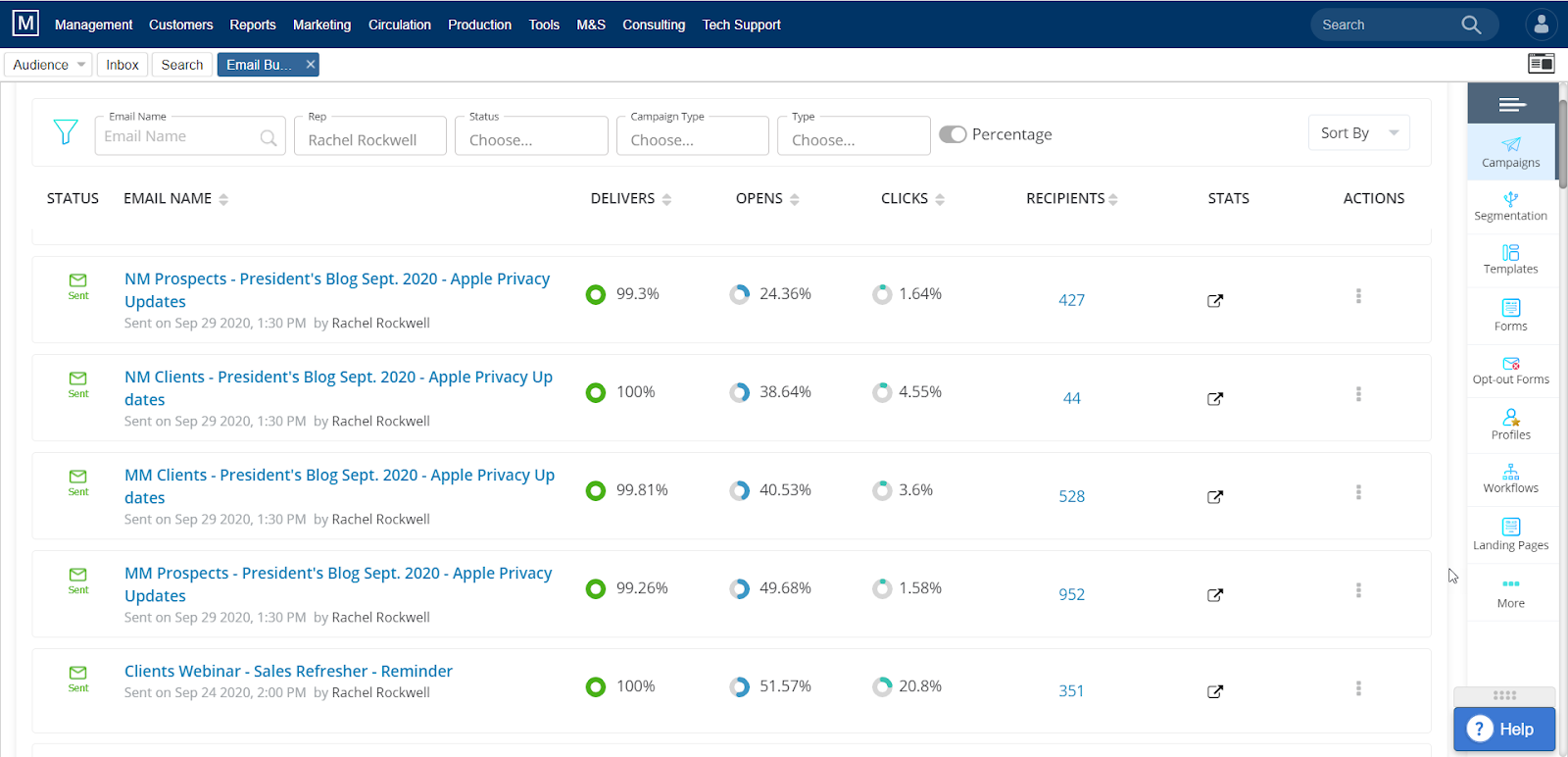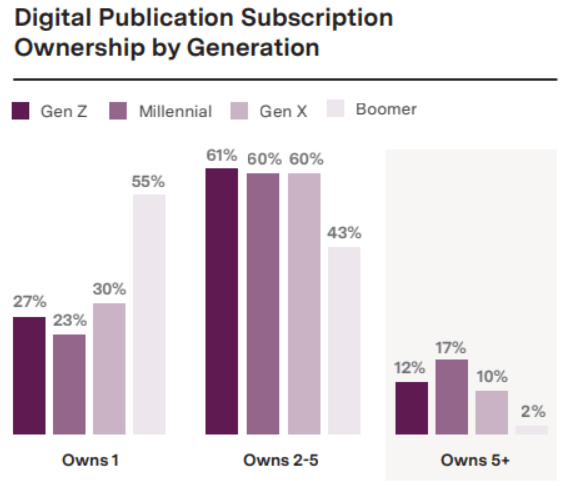Table of Contents
- Artificial intelligence will integrate with CRM.
- Marketing CRMs will be emphasized.
- Social CRMs will continue to rise.
- Voice search will transform user interfaces for CRMs.
- A new type of CRM user will request more sophisticated features.
- Subscription models will become commonplace.
- Vertical markets get a personalized CRM from the start.
- A Summary of CRM Trends
To maintain a Rolodex of clients, companies across all industries migrated away from writing in notebooks, updating spreadsheets, and taking mental notes. In today’s digital era, a customer relationship management (CRM) software is essential for marketing and sales teams.
Marketing CRMs track digital interactions on websites and social media, send automated emails based on sales readiness, and so much more. They’re undoubtedly a necessity of every business to nurture leads, retain clients, and everything in-between. Moving beyond utilizing the basics of the software, what’s in store for the marketing CRM in the future?
Artificial intelligence will further integrate with CRM.
CRMs began as an addition to current software, evolving into browser extensions and apps to complement existing tools. Today, most companies rely on SaaS (Software-as-a-Service) cloud-based technology for this marketing necessity. And any SaaS not embracing AI at this point is quickly being left behind.
McKinsey estimates that AI’s impact on the global economy could be upwards of $4.4 trillion annually, with automation capabilities that could account for almost 30% of the hours worked in the U.S. by 2030.
Almost 95% of marketers are integrating AI technology in their marketing processes, from using generative AI to create blog content to using tools like Marketing Manager’s AI Landing Page Generator to create time-saving templates.
As the technology advances, so too obviously will the marketing capabilities, tied further to specific key performance indicators and the all-important ROI.
Marketing CRMs will be emphasized.
Customer relationship management software were first branded as a solution for sales teams. It allowed sales reps to see the pipeline of digital interactions, score leads by sales readiness, and nurture them toward making a purchase.
While most CRMs still hold those capabilities, a huge shift rebranded these tools as a solution for marketing teams. If a marketer can see the clickstream of multiple leads, they can find a pattern. Using this pattern, they can more efficiently use their resources to campaign at that stage in the buying process. Marketing CRMs eliminate second-guessing the goals and next steps for marketing teams.
We’re on top of this industry trend, as Mirabel’s Marketing Manager integrates email marketing and workflow automation (landing pages, forms, etc.) with a robust customer relationship management tool.


Social CRMs will continue to rise.
Speaking of shifting to marketing CRMs, organic and paid social media marketing is arguably the most recent big player to change the advertising game permanently. With the influx of usership and industry competition across Facebook, Instagram, LinkedIn, YouTube, TikTok, and a dozen other tech giants, social media isn’t going anywhere.
Chances are your target audience uses at least one platform professionally or personally. Because you want to strengthen online reputation management and build relationships with your target audience, many marketing CRMs are starting to integrate with social media accounts.
These marketing CRMs allow you to track new followers and engage within the software, which effectively eliminates using the app or opening a new tab. They also compile more reliable analytics, as many marketers fall victim to tracking only platform analytics, which have different barometers for success than less-biased third-party competitors.
The rise of marketing CRMs, especially in the social media realm, is expected to boom in 2024 and beyond.
Voice search will transform user interfaces for CRMs.
Because SaaS companies are consistently looking to improve their user experience, adjusting the interface for accessibility is a key consideration. AI and voice technology that better captures voice conversations for sales reps will save incredible amounts of time.
As more users skip the keyboards, the anticipation is that more SaaS companies will include “voice assistant usage and supporting hardware in operational processes and interfaces.”
A new type of CRM user will request more sophisticated features.
According to Software Advice, the top-requested features for CRMs years ago were contact management, digital interaction tracking, and scheduling/auto-reminders. About a quarter of users wanted sales pipeline monitoring, but now, these features are only standard for most CRMs.
In 2024, the prediction is that users will want more advanced features in their CRM: Sales automation, a central database, email marketing, customization, AI capabilities, and reporting/analytics — all of which Mirabel’s Marketing Manager offers.
Customization is a huge consideration for many users, and the request is only growing. More priority is placed on the ability to modify a CRM with customizations such as additional fields and modules, more control over user access, and layout creation.
The increase in desire for more sophisticated CRM features, especially customization, means that a new kind of CRM user is here: The Millennial. Growing up and engaging in on-the-go learning with a new world at their fingertips, they’re more than comfortable using customer management relationship software for everyday sales and marketing.
Their want and need for features that harness autonomy indicate an increase in technical literacy across the board, and SaaS companies will have to stay one play ahead. They have to do so by staying intuitive to the user experience and adjusting to new digital behaviors.
Subscription models will become even more commonplace.
Subscription economy is nothing new, but watching its growth has been whiplash-inducing. The most common service seems to be media, specifically Netflix, Disney+, and so many other streaming players. Other media subscription services included digital classes (MasterClass, ClassPass), video and music streaming (YouTube, Spotify), and more. Even the old subscriber-guard of publishing outlets are constantly rethinking their tactics for fighting off churn and keeping their subscribers.


(Photo Source: NRG & Toolkits’ “Succeeding with Subscriptions”)
As a result of buyers subscribing to monthly or yearly payments instead of a-la-carte or per purchase, CFOs are seeking new sales and finance systems to support recurring revenue models, such as Mirabel’s ChargeBrite, which helps manage subscriptions with billing automation and simplified billing operations.
This is no different for marketing automation and CRM software. There’s a quiet industry transformation from SaaS to XaaS, also known as Everything-as-a-Service. We already talked about CRMs beginning to integrate sales, marketing, and social media, but XaaS takes it a step further.
The concept can transform any IT function “into a service for enterprise consumption. XaaS includes any computing service delivered via the internet and paid for via a subscription rather than an upfront cost.”
Vertical markets get a personalized CRM from the start.
As CRM grows, niche markets will receive personalized software that automate their everyday workflows, consider their pain points (as opposed to a generic “business” problem), and adjust to industry-specific regulations. Healthcare, manufacturing, finance, and other highly regulated industries will soon have their choice of vertical-oriented CRMs.
While Mirabel’s Marketing Manager is an affordable marketing automation software for every business, our specialty in the publishing industry makes it a perfect fit for this vertical. Complemented by The Newspaper Manager and The Magazine Manager, our marketing CRM and automation software is the go-to for publications across the nation.
A Summary of CRM Trends
The next few years will prove to be huge for customer relationship management, especially in conjunction with bettered marketing automation software and sales tactics. To round up what to expect for CRM trends in 2024 and beyond, here’s what we know:
- Integrations with artificial intelligence, social media, and marketing will become a go-to strategy.
- Advanced features, like voice search and customization, will be requested by a new, more technically literate CRM user.
- Subscription models for software will become commonplace, making it easier for consumers to purchase.
- Vertical markets may soon get personalized CRMs from the get-go to aid in abiding by regulations.
At Mirabel’s Marketing Manager, we’re prepared to stay ahead of the industry trends, readying our software to help you achieve your business goals every year.
SEE FOR YOURSELF
Watch an overview to learn how B2B marketing automation by Mirabel Technologies can help you increase traffic, optimize your funnel, drive more leads, improve conversions, and boost ROI — at a price you can afford!

